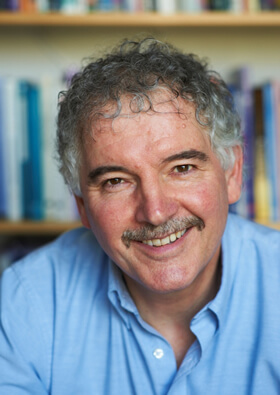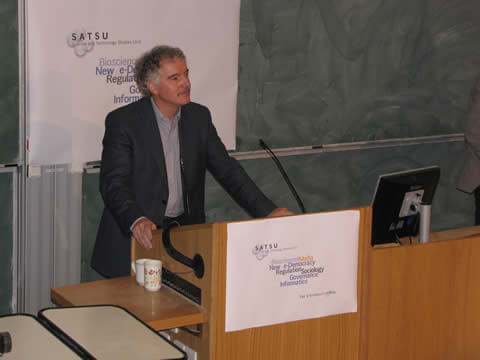4S Mentoring Award 2017: Andrew Webster
The nomination dossiers that we received documented a wide array of important mentoring practices, describing the ways in which these scholars have:
- crafted the education of novices to facilitate their metamorphosis into fully independent researchers;
- introduced students and scholars to STS at many different career stages, from undergrads though mid-career scholars;
- introduced their own advisees to broader scholarly networks, without concern for credit or publicity;
- guided young people through the complex infrastructures for crafting knowledge;
- built strategic new infrastructures to enable the development of the next generation in new directions;
- exercised leadership in ethical and effective ways;
- brought newcomers into networks that extend beyond departments, disciplines, nations; and
- exemplified human decency and warmth in scholarly communities.
For the past 30 years, Professor Webster’s mentoring has not only focused on supporting individual students but also creating institutional environments for them. He founded the Science and Technology Studies Unit (SATSU) at York University, where he has also been director of the Sociology Department as well as Dean of Social Sciences. Thanks to his work, the Science and Technology Studies Unit became a European Marie Curie training site for doctoral students from across Europe and organized a number of PhD summer schools. Additionally, he has directed national research programmes for the ESRC and MRC and he recently co-founded the UK STS-network Association for Studies in Innovation, Science and Technology in the UK, AsSIST-UK. And, as many of his mentees have pointed out, he has always been just Andrew.
Along with a sense of humor and a work ethic that many have acknowledged, Professor Webster has left a mark on this students by given them the most precious thing scholars have: his time. As stated in letters of support,
Many (students) have experiences with Andrew participating in an event, staying for the entire time, and helpfully commenting on everyone’s work. In doing so, Andrew has an astonishing ability to theorize upon everyone’s contributions and bring them to a higher level, finding commonalities as well as fascinating novel questions on the way. At the end of a meeting, Andrew is able to sum up the meeting in a way that makes everybody feel that they have contributed something valuable.

At the same time, Professor Webster’s mentoring has gone beyond the supervision of thesis and graduate students at York. From opening up his own home for annual BBQs with students and friends to co-authoring an impressive number of papers and book chapters, he has been able to make mentees to feel welcomed, respected, and valued. He also has had active roles in the Dutch Science and Technology PhD schools (WTMC) and the Postgraduate Forum on Genetics and Society (PFGS), helping to forge long-lasting relations with students in other countries, such as Sweden and Australia.
In short, Andrew Webster has trained generations of scholars in the UK and abroad, has provided helpful insights for students and early career scholars, and has been a role model for them. We feel honored to award him the 2017 4S Mentoring Award.
Mentoring Award Committee Members: Leandro Rodriguez Medina, Universidad de las Américas Puebla, Mexico (Chair); Kaushik Sunder Rajan, University of Chicago, USA; Sharon Traweek, UCLA, USA; Anita Say Chan, University of Illinois USA; and Arie Rip (2016 Mentoring Award Winner).
Acceptance
I am delighted to receive the 4S Mentoring Award, which is a very generous recognition of the many years of my working with younger colleagues, from whom I have learned so much, and with whom I have had so many interesting discussions. They have all been wonderful, and it has been a pleasure collaborating with them to build new networks and ideas in STS. It has indeed been a privilege to know them. We’ve had lots of fun too, but I doubt that was dependent on any mentoring on my part!
From the very early days when I set up SATSU (first at Anglia Ruskin in Cambridge and then the move to York in 1999), I have sought to provide a vehicle which would build a team locally as well as help to foster links and networks nationally and internationally. Over the years, I supervised many doctoral students and I worked closely with early career researchers at York and elsewhere. I am thankful that they remain in touch, and more importantly, that many have gone on to make important contributions to the field, not least in creating their own STS groups and fostering new networks.
More recently, I have been keen to build the UK STS community through co-founding the Association for Studies in Innovation, Science and Technology-UK. We now have almost 350 members who will be able to draw on the intellectual and collaborative opportunities the Association is helping to provide. It has also been great to see many other national bodies emerge over recent years, again because they can help build STS capacity for the future.
I am especially pleased to receive the award following in the wake of Arie Rip who received it last year. He is someone I have always held in high esteem and indeed he was something of a mentor to me in the early days of my STS academic life. Finally, let me thank those who nominated me – all exceptional scholars and friends – and thank 4S again for this marvellous award which I shall always treasure.
Bio
Professor Andrew Webster is Director of the Science and Technology Studies Unit (SATSU), at the University of York, which he established in 1988. He was Director of the 5m ESRC/MRC Innovative Health Technologies Programme, is a member of various national Boards and Committees (including the UK Stem Cell Bank Steering Committee, Pharmacy Research UK, and the Regenerative Medicine Expert Group), and was Specialist Advisor to the House of Commons Health Select Committee. He was national co-ordinator for the ESRC’s 3.5m Stem Cells Initiative (2005-9) and is PI on a 1.5m ESRC-funded project on regenerative medicine, ‘REGenableMED’. He is also Co-I on a recently started project exploring gene therapy, and collaborating with colleagues at the University of Montreal on research relating to ‘responsible health innovation’. He is Co-Editor of the Health Technology and Society Series published by Palgrave Macmillan. His recent books include The Global Dynamics of Regenerative Medicine (2013). He was elected a Fellow of the Academy of Social Sciences in 2006. He was Head of the Department of Sociology 2005-9 and Dean of Social Sciences, 2009-13 at York. He is Co-Chair of the Association for Studies in Innovation, Science and Technology-UK.

